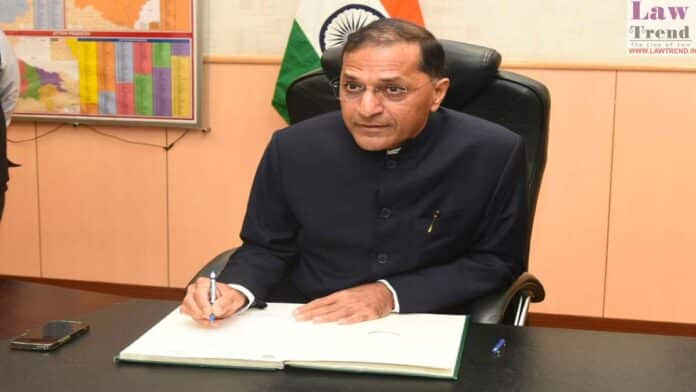The Supreme Court on Thursday said it was mystified as to how bureaucrat Arun Goel applied for voluntary retirement on November 18 last year if he was not aware about the proposal to appoint him as an Election Commissioner.
The top court noted that a vacancy in the post of Election Commissioner arose upon the appointment of Rajiv Kumar as the Chief Election Commissioner with effect from May 15, 2022.
The apex court said the appointment to the post of Election Commissioner was made apparently on the basis that there was no hindrance to the making of the appointment as there was no specific law.
A five-judge constitution bench headed by Justice K M Joseph took note of the submission by the Centre that approval was sought on November 18, 2022 for the appointment of one Election Commissioner and on the very same day, drawing upon the database of IAS officers, serving and retired, in the position of Secretary to the Government of India, it was accessed.
“On the same day, i.e., on November 18, 2022, a note was seen put-up, wherein the Law Minister had suggested the panel of four names for the consideration of the Prime Minister and the President…
“The appointee, it was noted was to superannuate in the month of December, 2022 and had taken voluntary retirement, was found to be the youngest of the four members of the panel…Not coming as a surprise, on the same day, his appointment as Election Commissioner was also notified. We are a little mystified as to how the officer had applied for voluntary retirement on November 18, 2022, if he was not in the know about the proposal to appoint him,” the top court said.
The apex court said an appointee to the post of Election Commissioner or Chief Election Commissioner should have a period of six years as laid down in law as it would enable the officer to have enough time to gear himself to the needs of the office and assert his independence.
“The philosophy behind giving a reasonably long stint to the appointee to the post of Election Commissioner or the Chief Election Commissioner is that it would enable the officer to have enough time to gear himself to the needs of the office and to be able to assert his independence. An assured term would instil in the appointee the inspiration and the will to put in place any reforms, changes, as also the inspiration to bring out his best.
“A short-lived stint may drain the much-needed desire besides the time to fulfil the sublime objects of the high office of the Election Commissioner or the Chief Election Commissioner. Any tendency towards placating the powers that be would wax as also the power and the will to assert his independence may wane, bearing in mind, the short tenure. This apparently is the underlying philosophy of the law made by Parliament, assuring, a term of six years,” the bench said.
The top court said if it is not followed the object of the law and its command would stand defeated.
“We must make it clear that the observations are not meant to be an individualised assessment of the appointee, who we do note, has excellent academic qualifications. But as we have noted academic excellence which members of the civil service may possess cannot be a substitute for values such as independence and freedom from bias from political affiliation,” it noted.
The bench also comprising Justices Ajay Rastogi, Aniruddha Bose, Hrishikesh Roy and CT Ravikumar said Parliament enshrined a term of six years separately for the Chief Election Commissioner and the Election Commissioner.
“This is the Rule, it is found in Section 4(1). A proviso cannot arrogate itself to the status of the main provision. The exception cannot become the Rule. Yet, this what the appointments have been reduced to. It undermines the independence of the Election Commission. The policy of the law is defeated,” it said.
The observations came in a judgment in which it ruled that the appointment of the Chief Election Commissioner and ECs will be done by the President on the recommendation of a committee comprising the Prime Minister, Leader of the Opposition in the Lok Sabha and the CJI to maintain the “purity of election”.
The top court had earlier questioned the “haste” and “tearing hurry” with which the Centre appointed Arun Goel as an Election Commissioner, saying his file travelled at “lightning speed” within departments in 24 hours.
The central government had vehemently resisted the observations, with Attorney General R Venkataramani contending the whole issue pertaining to his appointment needed to be looked at in entirety.
The top court had asked how the Union law minister short-listed a panel of four names that was recommended to the prime minister for appointment as Election Commissioner when none of them would have completed the stipulated six-year tenure in office.




